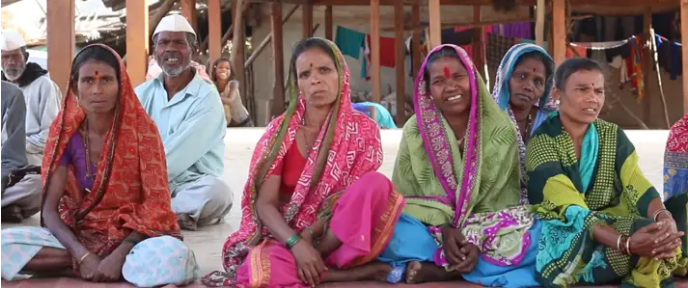Eighteen months ago, Nanda could not read or write - today she regularly reads stories to her parents! The ADIVASI VOICES PROJECT is changing the lives of Nanda and others in her remote tribal community in Maharashtra, India. Her teacher says, "Thanks to the project there is now 100% school attendance and there are more girls in school than boys. You have helped parents see the value of education.”
Adivasi Lives Matter
In today's tech savvy world, information is just a click away with our mobile phones and computers, or if those aren't in reach, our televisions and even radios all help keep us informed. But what if we didn't have any of these available to us? How would we find out important health and community information? HCR has been working in partnership with Seva Social Welfare Foundation in remote parts of India’s Maharashtra state, home to many indigenous groups known as Adivasis.
"You kept your promise!"
What a joy to be back in the remote Maharashtran village of Kahandol in time to celebrate the inauguration of their two new wells. Just four months earlier I had been standing on a dried up riverbed with my Indian colleagues, Shilpa, Sam and Akshay and the head of the village, Patil Ramdas Warde. Ramdas told us how the drought had brought great hardship to his village, with only 28 days of water, and he had asked us if there was anything we could do to help …
Water: essential for life
Our partner, Seva, working among tribal people in Maharashtra had gone to distribute SD cards for latest audio programmes for the 'speaker boxes' when they discovered the community in Kahandol in great distress due to lack of water. They found people desperately trying to dig pits to find water, but with little effect. Seva’s Chief Executive, Shilpa Shinde said they had to do something to alleviate the community’s distress.
"Only 28 days until the water runs out!"
“Only 28 days until the water runs out”, says Patil Ramdas Warde, the leader of a village in Maharashtra. Such is the plight of many tribal communities across the county. The lack of rain has led to major crop failure. Eighty per cent of the rice plantations have failed to yield a harvest. As the Patil – meaning ‘village head’ – shared his worries with us, the need of the Adivasi Village Project became increasingly apparent.
The Road to Maharashtra
HCR is back in India! It’s been six months since Jon visited, and he’s excited to see the progress that Seva Social Welfare Foundation has made. HCR is about journeying with partners as they build capacity, equipping local people to make a meaningful social impact within their communities. Just as HCR is journeying with Seva (meaning ‘service’), I am journeying with Jon.
Stigma – a personal perspective!
Day 12 of #16DaysofActivism
By Shilpa Shinde
Let’s face it, India doesn’t have a great track record when it comes to valuing women! We rank 174th out of 189 on the gender inequality index. As the leader of a small NGO I can tell you, it’s a man’s world and I have to work very hard to make my voice heard! But the issue that has been bothering me most lately is the issue of stigma and particularly how women are affected by it.
Take my close friend Anugrah*. She got pregnant before marriage and was unaware that she had been carrying a child for 3 months. She admits she was very naïve and not aware of much in those days but she was very afraid that her parents and her community would reject her.
After she and her boyfriend discovered that Anugrah was pregnant, he secretly gave her a drug which he had been told would induce an abortion. The effect however was to make her very ill, which raised the suspicion of her family, who eventually found out. Anugrah and her boyfriend’s family then entered discussions and she was put under great pressure, particularly by his family, to abort the baby. Augrah felt compelled to go through with the abortion, with the promise from her boyfriend’s family that they could get married soon afterwards. Sadly, not only did they not keep their promise or help her through the procedure, which made her very ill, but they rejected her. They seemed more concerned for their image in society and the church.
Anugrah was blamed for not ‘not keeping her purity’, while the son was exonerated from any blame, stigma or shame. She has endured rejection and shame from her church and community and even been kicked out of her youth group. Many of her friends rejected her.
Thankfully the story doesn’t end there. Anugrah is now one of our key workers, helping our charity, Seva, serve poor and marginalised indigenous or Adivasi communities in our state. She has amazing empathy, especially with girls and women, who suffer greatly. And they love her… they know she feels their pain.
Seva is a key HCR-partner in India, using a community-centred media approach to bring about holistic transformation among tribal communities (see http://www.h-c-r.org/news/2018/9/12/village-gets-a-new-voice)
*Not her real name
Village Gets a New Voice
It’s hard to find many places on the planet today that don’t have access to some form of media. However in remote parts of India’s Maharashtra state, many indigenous tribal or Adivasi communities don’t have access to radio, television or even mobile ‘phones. Many can’t read.
It’s for that reason that HCR, in partnership with Seva Social Welfare Foundation, has begun a project to distribute “speaker boxes” with content that will transform lives.



